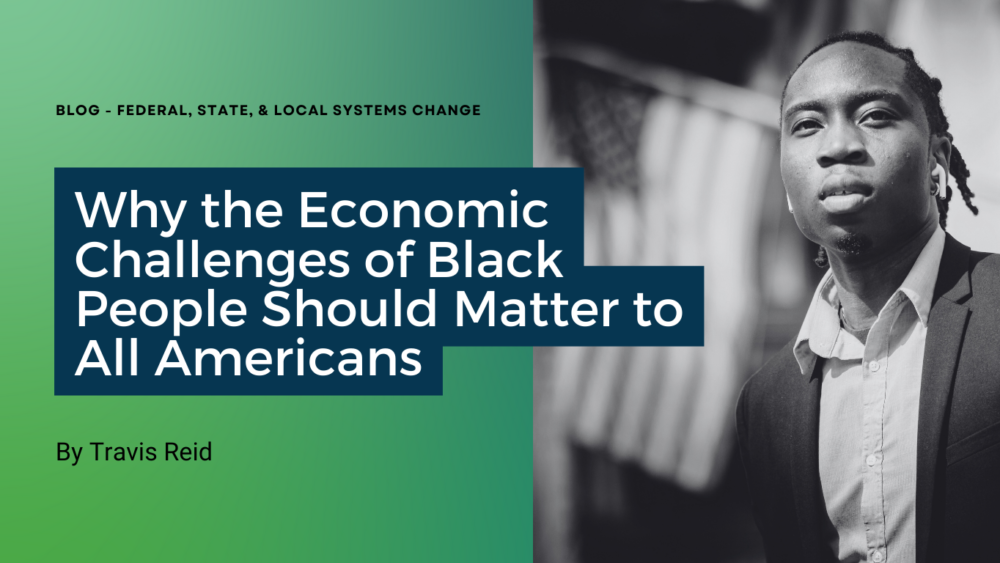As Black History Month Officially Ends, Our Focus on Black People and the Economic Challenges that Impact Them Should Not
During Black History Month and throughout the year, I regularly pause to reflect on the contributions of Black Americans. And while I marvel at the contributions made by Frederick Douglass, Ida B. Wells, Congressman John Lewis, Rev. CT Vivian, and countless others, I always return to the work of Rev. Dr. Martin Luther King, Jr. Dr. King led a movement that, while declaring the moral and philosophical significance of treating all people equally, simultaneously worked to influence legislation that provided legal protections and equal rights. After many of the legislative wins of the Civil Rights Movement were secured, King more directly focused on issues of economic equity for Black Americans.
It is historically true that advocating for Black people has led to a more inclusive economy and society for all Americans. Just as it was in the 1960’s, it is essential that we continue to focus on the economic well-being of Black people to have an economy that thrives for all people. In recent years, many of the legislative and policy advances achieved by the Civil Rights Movement have been challenged. Most notably on June 29, 2023, in 6 to 3 vote, the Supreme Court rendered its decision in the cases filed by Students for Fair Admissions, Inc against Harvard University and the University of North Carolina. In its ruling, the court determined the race conscious admission policies of both institutions violate the Constitution. These rulings effectively end affirmative action in higher education, with few exceptions.
The aftermath of these supreme court decisions have had swift and expansive consequences. Beyond higher education admissions, this decision is now impacting entrepreneurship, inclusive procurement initiatives and legal internships. Diversity initiatives are now threatened by, or are actively battling, lawsuits for targeting specific racial minority groups.
- The Fearless Funds was sued for its focus on providing much needed capital for Black owned businesses through its Fearless Strivers Grant Contest. These $20,000 grants are being challenged as a violation of the Civil Rights Act of 1866.
- The law firms Perkins Coie and Morrison & Foster were sued for fellowship programs that explicitly recruit diverse candidates for the legal industry.
OneTen, originally established to lift one million Black workers into good-paying jobs in ten years, is an example of how some workforce initiatives are adjusting their strategies in the wake of the recent Supreme Court rendering about race conscious decision making. A recent New York Times article details OneTen’s pivot to adopting a broader skills-based hiring approach. Ken Chenault, chairman of OneTen, notes that “there is a fundamental business reason for companies to convert to a skills-based hiring system, beyond all of the social justice themes that got us off the ground.” This is a prime example of how an initial focus on Black workers created opportunities for all.
Considering the aforementioned impact, and in light of history, focusing on Black people and the issues that impact equity and economic well-being are worthy pursuits for all Americans, for two main reasons: data show there is continued inequity for African Americans, and inclusivity has a buoying effect for all groups.
Data Reveal Continued Inequity for African Americans
The historic inequities that lead to the creation of affirmative action are still present. Data suggest that the need for race conscious initiatives are as important for marginalized groups now as they ever have been. In The Economic State of Black America: What is and what could be, the McKinsey Global Institute noted the following statistics relative to Black Americans in the workforce:
- Black workers are disproportionately represented in low-wage occupations and underrepresented in higher-wage occupations.
- The median wage for all US workers is around $42,000 per year, but 43 percent of Black workers earn less than $30,000 per year.
- Black workers are concentrated in lower-paying occupations and underrepresented in higher-paying ones.
- Black workers are underrepresented in higher-paying professions relative to their 13 percent share of the labor force. Only 5 percent of US physicians are Black, for example, which has implications for the quality of care.
Inclusivity has a Buoying Effect For All Groups
The legislative impact of the Civil Rights movement was collective and inclusive. From the Montgomery Bus Boycott—which led to the Supreme Court declaring bus segregation unconstitutional in 1955—to the Supreme Court ordering Ole Miss to integrate its student body by admitting James Meredith in 1962, the movement was effective in spurring our nation’s highest court to action. Similarly, The Civil Rights Act of 1964 and The Voting Rights Act of1965 both respectively banned race-based discrimination in public places, established the Equal Employment Opportunity Commission and provided Black people the right to vote. These wins created a more just society and new opportunities for women and all marginalized groups. All people benefited, not Black people alone.
On May 8th 1967, Dr. King was interviewed by NBC News correspondent Sander Vanocur. During this 26-minute conversation, King discussed what he viewed as a new phase of the Civil Rights movement. He articulated the inextricable connection between historic economic injustices and the impact they have on the recovery and growth of marginalized communities.
I believe we ought to do all we can and seek to lift ourselves by our own bootstraps, but it’s a cruel jest to say to a bootless man that he ought to lift himself by his own bootstraps, and many Negroes by the thousands and millions have been left bootless as a result of all of these years of oppression and as a result of a society that deliberately made his color a stigma and something worthless and degrading.
Economic injustices have long been enabled by legal structures. As we navigate a post- Affirmative Action context in America, let’s remember all people who may be without boots and bootstraps in our society and in our economy. Let’s think of them as we think of ourselves. Together, as we were reminded by Barack Obama, we can help provide boots. There is no better way to commemorate Black history than to identify with marginalized groups and support their uplift.
Meet the Author
Travis Reid
As Vice President of Operations and Strategy, Travis leads the strategic development of high-impact workforce initiatives and organization level operations. He works to ensure that people and processes are in place to effectively design and execute strategies that align with CSW’s mission and values. Continue Reading >>




Comments are closed.